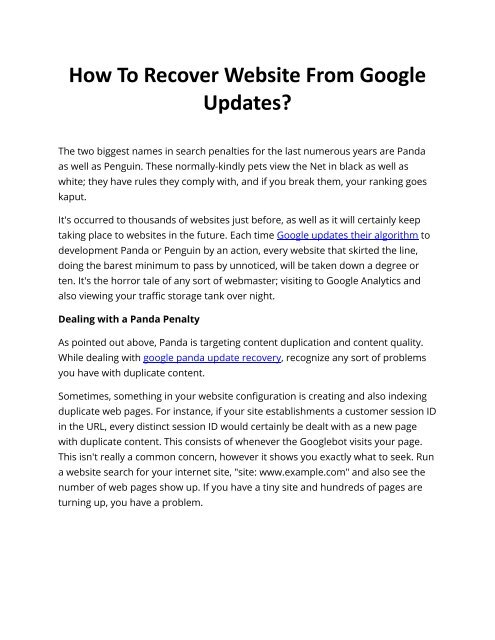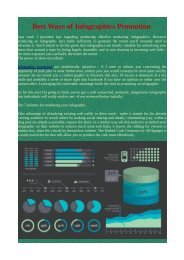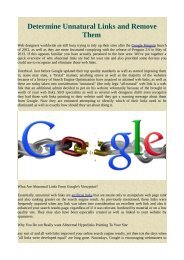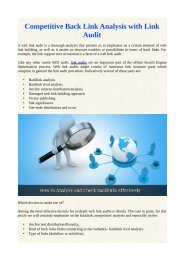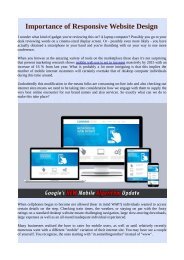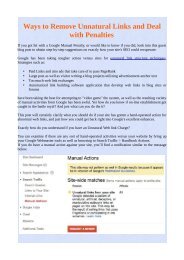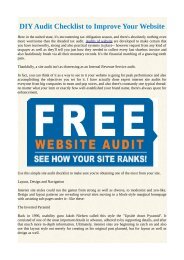You also want an ePaper? Increase the reach of your titles
YUMPU automatically turns print PDFs into web optimized ePapers that Google loves.
<strong>How</strong> <strong>To</strong> <strong>Recover</strong> <strong>Website</strong> <strong>From</strong> <strong>Google</strong><br />
<strong>Updates</strong><br />
The two biggest names in search penalties for the last numerous years are Panda<br />
as well as Penguin. These normally-kindly pets view the Net in black as well as<br />
white; they have rules they comply with, and if you break them, your ranking goes<br />
kaput.<br />
It's occurred to thousands of websites just before, as well as it will certainly keep<br />
taking place to websites in the future. Each time <strong>Google</strong> updates their algorithm to<br />
development Panda or Penguin by an action, every website that skirted the line,<br />
doing the barest minimum to pass by unnoticed, will be taken down a degree or<br />
ten. It's the horror tale of any sort of webmaster; visiting to <strong>Google</strong> Analytics and<br />
also viewing your traffic storage tank over night.<br />
Dealing with a Panda Penalty<br />
As pointed out above, Panda is targeting content duplication and content quality.<br />
While dealing with google panda update recovery, recognize any sort of problems<br />
you have with duplicate content.<br />
Sometimes, something in your website configuration is creating and also indexing<br />
duplicate web pages. For instance, if your site establishments a customer session ID<br />
in the URL, every distinct session ID would certainly be dealt with as a new page<br />
with duplicate content. This consists of whenever the <strong>Google</strong>bot visits your page.<br />
This isn't really a common concern, however it shows you exactly what to seek. Run<br />
a website search for your internet site, "site: www.example.com" and also see the<br />
number of web pages show up. If you have a tiny site and hundreds of pages are<br />
turning up, you have a problem.
Whenever possible, carry out an approved URL for any sort of web page that<br />
produces duplicates. This essentially tells <strong>Google</strong> that you realize your website is<br />
producing duplicate URLs for the very same page, yet they're truly all X page, do not<br />
stress regarding it.<br />
Slim material is a bit harder to diagnose. It's usually located in ecommerce web<br />
pages, where product descriptions are short as well as provide little of worth. That's<br />
why lots of webshops today have lengthy descriptions, banks of photos, deep<br />
option choice menus as well as customer evaluates all on the very same page.<br />
Another common transgressor is if you have a lengthy FAQ set up on your site, with<br />
each concern as well as solution set residing by themselves URL. No solitary inquiry<br />
as well as response is visiting be deep as well as comprehensive enough-- a lot of<br />
the moment-- to count as valuable material. <strong>Google</strong> doesn't consider the FAQ all at<br />
once, when it's spread throughout lots of pages.<br />
<strong>To</strong> take care of slim material, you should check out each page and figure out just<br />
how best to make that info better. Sometimes, you could roll the page in with other<br />
pages, and redirect the URL through 301 redirect. In other instances, you will be<br />
able to add details to the existing web page. In some rare instances you will<br />
certainly be ideal off removing the page as well as redirecting to your homepage.
Dealing with a Penguin Penalty<br />
As stated, Penguin despises bad and abnormal hyperlinks. The primary step to<br />
fixing this issue is to determine if you have spammy web links. A device like Ahrefs,<br />
which draws your entire backlink profile, will provide you a strong listing of web<br />
links. You could view high quality evaluations of those web links, however you're<br />
going to need to go through the profile by hand. If you have a couple of hundred<br />
links, this bores however not too bad. If you have countless backlinks, it's going to<br />
be a problem.<br />
Ideally, you'll wish to export your backlinks into a table you could work with. Any<br />
kind of URL you recognize is a legit site, strip from the data source; those web links<br />
are okay to keep. Afterwards, start going to hyperlinks. Any type of reputable page,<br />
pull from your data source to keep. Any type of web page that is undoubtedly<br />
spam, take down.<br />
When you're done with this procedure, you'll be left with a document loaded with<br />
every one of your crappy incoming hyperlinks. You're visiting want to run this list<br />
with <strong>Google</strong>'s Disavow Links tool. This informs <strong>Google</strong> that you don't recommend<br />
those links and that they shouldn't count against you.<br />
You could also function to get those web links removed, by calling web designers,<br />
but this is typically a futile endeavor. Spam webmasters typically aren't likely to care<br />
about your pleas for a great web link profile.


